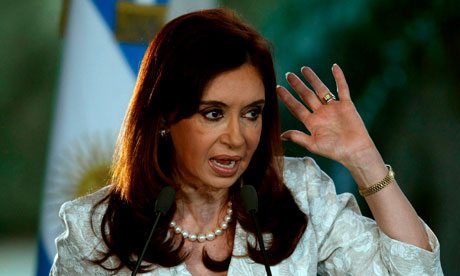Argentinian politicians and global debt campaigners have responded with fury to a US court judgment that risks plunging the country back into default, reports The Guardian.
Elliott Capital Management and Aurelius Capital Management, regarded as “vulture funds” by Buenos Aires, won a ruling in a New York court on Wednesday that could force Argentina to hand over $1.3bn (£816m) in repayments and interest to the tiny minority of bondholders who refused to sign up to a hard-fought writedown of its debts after the country defaulted in 2001.
Judge Thomas Griesa upheld his own ruling of last month backing Elliott Associates, and said: “Argentina owes this and owes it now.”
In a strongly worded statement, Griesa said that Argentina should make repayments to the so-called holdouts at the same pace that it is repaying the vast majority of bondholders who did agree to a debt-swap. He also warned that US-based bank BNY Mellon, which handles Argentina’s debt payments to US-based bondholders, would be acting “in active concert” with the republic, if it failed to comply with the ruling.
If some of the country’s repayments were diverted to the vulture funds, however, it could reduce the amount available for Argentina’s other lenders, pushing it into a technical default on more than $60bn in outstanding debts. Buenos Aires has repeatedly made clear that it has no intention of paying anything to the plaintiffs in the case.
Nick Dearden, director of the Jubilee Debt Campaign, said: “It is completely outrageous that the intransigence of a couple of speculators can bring a sovereign nation to the verge of bankruptcy. These vulture funds never lent money to Argentina – they gambled on a crisis that caused enormous poverty and suffering in that country.”
Agustín Rossi, leader of Cristina Fernández de Kirchner’s bloc in the lower house of congress, described the ruling as “absolutely despicable”.
A spokesman for BNY Mellon said: “As we indicated in our filing with the court, in our role as trustee we do not believe we should be bound by the injunction.”
Investors pushed up the price of insuring against a fresh default by Argentina , with short-dated credit default swaps putting the probability at 60%.
Argentina’s $95bn default more than a decade ago came in the midst of a wrenching financial and political crisis, after the International Monetary Fund withdrew financial support and the government decided it could no longer afford to prop up the value of the peso, which was pegged to the dollar. After years of fraught negotiations with investors, more than 90% signed up to a drastic writedown of more than 70% on the value of their debts in two separate deals in 2005 and 2010, which cleared the way for Argentina to return to international financial markets.
But with no agreed international process for handling the bankruptcy of a state, the consequences of Argentina’s default have played out over more than a decade, through scores of separate court rulings.
Before the New York judge’s latest ruling, Fernández, the president, had already made it clear that her government does not intend to negotiate with the holdouts. “We will not surrender money at the cost of hunger and exclusion for millions of Argentines,” she said at a public appearance at a steel plant in Villa Constitución earlier this month.
“We are not going to give in,” she said. “We need to be intelligent, sensible and calm and not respond to provocations from those who want restore an ultraconservative regime that destroyed Argentina.”
“These funds are vultures who seek to profit by betting on a technical default,” Hernán Lorenzino, the economy minister, said in anticipation of the ruling, warning that Argentina would fight the holdouts all the way. He pledged to pursue the issue through higher US courts. “We will continue defending Argentina’s interests at every instance necessary and that includes going before the US supreme court.”
The judge’s decision comes at what is perhaps the most difficult moment in Fernández’s presidency, with popular discontent rising because of her government’s failure to correct an economy that has begun stagnating after nearly a decade of continuous growth.
Argentina was brought to a virtual standstill on Tuesday by the first national strike against her presidency, organised by the same Peronist labour unions who were once her staunchest supporters.The country ground to a halt as labour leaders demanded wage hikes to offset a yearly inflation rate that independent economists estimate at a yearly 25%. The middle class had already taken to the streets earlier this month when a million protesters took to the streets in various cities across Argentina also protesting against high inflation, economic stagnation, corruption in government and the rising crime rate that seems to be accompanying the ailing economy.


